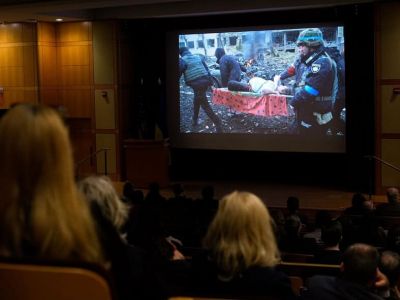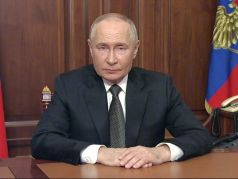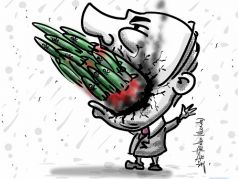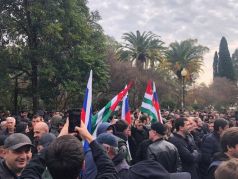Человек, потерявший дом, взвалил на тачку оставшиеся пожитки и упрямо идет по городу, опустошенному Апокалипсисом. Вокруг обстрел. Куда он идет? Зачем? Его спрашивают, а он не может ответить. Он только знает, что больше ему ничего не страшно и ничего другого не остается.
"Они стреляют, а я иду".
Это Украина. Ей тоже больше ничего не оставлено.
Я помню март 2022-го. Мы ходили на "Сирано де Бержерака" и останавливались в крошечном, любимом лондонском отеле “The Rookery” —18 век, скрипучие лестницы, мореный дуб и зеленые стены: это был задолго до того марта организованный Брэттом, подарок на мой день рождения …
В Мариуполе полыхали дома, пламя вырывалось из окон квартир, с балконов, и какая-то иррациональная часть сознания не вмещала, нашептывала: этого не может быть, потому что не может быть никогда! Это, наверно, какая-то дьявольская компьютерная мистификация, а всех людей заранее эвакуировали. Ведь, если бить по жилому многоквартирному дому, могут погибнуть люди… Не могли же намеренно бить по людям…
Люди сильно глупеют, когда мозг сталкивается с непостижимым.
Наш номер был на чердаке, под самой крышей, эту часть Лондона когда-то уже сильно бомбили в ПРЕДЫДУЩУЮ мировую войну (тем февралем она перестала быть последней), и вдруг— отчетливое видение-молния — ракета прошивает хрупкий, обшитый антикварным деревом потолок.
В телеграм-канале появилась совершенно реалистичная, крупным планом, фотография: собака выедает внутренности трупа, на котором видны остатки российской военной формы. Обглоданные реберные кости "освободителя", безумные глаза породистой, некогда явно домашней собаки…Это было первое мертвое тело, которое привело в состояние панической атаки —из комнаты вдруг выкачали весь воздух!— а потом уже подобное стало привычным ужасом новостей.
…В "The Rookery” нам подали ужин в библиотеку: овальный стол, крахмальные салфетки, хрусталь, гипсовые, безглазые Цезарь и Аристотель. За этот ужин среди чумы сейчас стыдно. Наши мысли, и разговоры были о том, как именно эта тварь ударит атомной бомбой по Европе, в чем даже официанты почти не сомневались. Паники не было, была горечь. Паника — это когда есть возможность от опасности убежать. Бессилие — оно цвета того бетона, что стены мариупольских подвалов. Конец цивилизации пришелся на нас. Бедные наши дети: мы-то все уже видели…
На следующий день мы вернулись из Лондона, а война все шла. Первая потрясшая новость: в мариупольском подвале от обезвоживания погибла шестилетняя девочка. Я очень сильно пережила смерть этой безымянной девочки, имени которой не знаю до сих пор. Я представляла ее в розовой шапке на фоне свинцово-грязного бетона. Я физически ощущала бессилие ее матери в темном, как склеп, бетоном подвале, что несколько дней, под грохот и свист вражеских снарядов, смотрела на умирающую дочку, которую она готовила к школе в сентябре…Их город обстреливал беспощадный, мерзкий враг, и воды не было. И мне казалось, что вот теперь-то, когда поймут, что происходит, этот кошмар остановят! Виделись улицы и площади российских городов, заполненные до отказа возмущенными толпами, требующими прекратить бессмысленное кровопролитие! Я ждала, и ждала, и ждала этих всемогущих толп. Напрасно. Их не было.
Нас в супермаркетах пропускали без очереди: мы узнавали друг друга по гигантским тележкам, полным бутылок воды, детских смесей, лекарств, подгузником, одеял, и прочего, прочего… Отвозили на пункты приема, которые организовывали обычно британские поляки, и возвращались опять, наполняли все новые и новые тележки…Мой друг, хирург из госпиталя на юге Англии, организовал отправку большегрузов с медикаментами и оборудованием для операций, была рада помочь заполнять эти большегрузы. Вся семья переводила помощь через Красный Крест. Потом — волонтерство. Но все казалось, что россияне вот-вот опомнятся, и их армия прекратит убивать…
В Лондоне туристы, как всегда, ходили с пластиковыми бутылочками: "врачи рекомендуют не менее полутора литров в день", и эти бутылочки вдруг приобрели трагический смысл. Мозгу, наверное, нужно время, чтобы осознать: мир рухнул, неважно, внутри этого обрушения ты или снаружи.
Новостями набухала атмосфера, как кровью то одеяло с божьими коровками, которым были покрыты носилки с беременной женщиной, которой осколок снаряда разворотил весь таз. Она еще была жива, на тех носилках, когда ее снимал Мстислав Чернов, корреспондент "Ассошиэйтед Пресс", донесший до нас трагедию Украины и безжалостность ее врага. На кадрах, которые я видела в 2022-м женщина прикрывала рукой свой огромный живот, словно безнадежно его защищая, но увидев ее опять в фильме Чернова "20 дней в Мариуполе", я до конца поняла, почему: она пыталась почувствовать, прощупать, жив ли ее ребенок внутри. До этого фильма я почему-то думала, что женщина осталась жива, но рассказ хирурга больницы, куда привезли рожениц из разбомбленного роддома, разрушил мою иллюзию. "Она кричала "Убейте меня!", поняв, что ребенок мертв, она умерла от массивной потери крови, несовместимой с жизнью". Умерла ПОСЛЕ своего ребенка, даже в последней милости умереть первой ей было отказано... Когда ее несли на носилках, с бедрами, изуродованными железным осколком, ноги ее были неестественно вывернуты, и это напомнило мне фотографии убитой в Израиле девушки в грузовике, у которой тоже были так похоже и так же страшно, как у поломанной куклы, вывернуты ноги…Я не сравниваю ничего, кроме этого.
Я больше никогда не смогу без содрогания смотреть на российский триколор (если в ту страну когда-нибудь придет осознание содеянного, первое, что следует сделать, это избавиться от этой кровавой тряпки, ассоциирующейся теперь у мира с мертвыми детьми). Не могу без содрогания смотреть на башни Кремля, даже на невинные туристические кадры Москвы, не смогу больше спокойно и радостно вспоминать наши поездки, все, что было связано с детством, юностью, доброй памятью, друзьями, прекрасными учителями — все это придется (пока не знаю, как!) отделить толстой водонепроницаемой перегородкой, как герметизируют отсеки в тонущих кораблях, отделяя затопленные от сухих. И буква Z навсегда впечаталась в сознание как "черная свастика в белом круге", и никогда уже, сколько живу, не будет иначе.
А за два года случилось страшное: война стала нормой для всех.
И, наверное, поэтому, когда смотрела бьющий током документальный фильм Чернова "20 дней в Мариуполе", который уже занял свое место в ряду исторических свидетельств преступлений против человечности, слушала тихий, спокойный, приглушенный голос за кадром (так переговариваются разведчики на боевом задании, чтобы не услышал враг), ловила себя на мысли, что к ужасу, потрясению и скорби подмешивается что-то еще. И поняла: я смотрю фильм с подсознательным, безотчетным чувством "подготовки": что делать, как вести себя, как поступать, если ВОЙНА не остановится, пойдет дальше и явится к нам.
Ведь война, ставшая нормой и зло, которому найдено благовидное оправдание, потому что так легче равнодушной совести, всегда идет дальше. Всегда. Крокодилу жертвуют первых в надежде, что он не доберется до всех. Но эта циничная и напрасная надежда. И никакой тут нет метафоры, а есть известный опыт ХХ века, прописанный в каждом школьном учебнике. Равнодушие совести— это анестетик, которым война, начавшая свой неостановимый марш, лишает воли к действию, разума и инстинкта самосохранения тех людей, которые могли бы ее остановить и не допустить собственной трагедии, но в плохой сценарий ОПЯТЬ не верят, не верят, не верят.
Все, не могу больше, возьму тайм аут…Страшный фильм. Все мировые лидеры, особенно Трамп, Орбан и папа римский, польские фермеры, немецкие (и любые!) "путинферштееры" должны его посмотреть. А в Гааге его должны постоянно транслировать в камерах военных преступников, как в "Заводном апельсине" Берджеса.
А в фильме Мстислава Чернова Человек, Потерявший Дом, потерявший все, идет и идет со своей тачкой пожиток- один по пустому городу, сквозь обстрел и густой, дымный, НАСТОЯЩИЙ апокалипсис. Куда он идет? Зачем? Его спрашивают, а он не может ответить. Он знает, что больше нечего бояться, все самое страшное уже видели его глаза, и ничего другого не остается, только идти.
"Они стреляют, а я иду",- говорит он.
Это Украина. Ей тоже больше ничего не оставлено.
И только Уинстон, когда-то спасший мир, ни о чем не спрашивал бы этого этого Человека: "Если понял, что идешь по аду, продолжай идти".
UPD. Добавила английский перевод. Sorry, it is Google translate. Даже не редактировала. Извините. Нет сил.
"THEY KEEP SHOOTING, AND I KEEP WALKING..."
A man who has lost his home, who has lost everything, has loaded his remaining belongings onto a wheelbarrow and stubbornly walks through a city devastated by the Apocalypse. Where is he going? For what? They ask him, but he cannot answer. He only knows that he is no longer afraid of anything and there is nothing else left.
“They keep shooting, and I keep walking.”
It is Ukraine personified. There is nothing left for her either.
I remember March 2022. We went to see “Cyrano de Bergerac” and stayed in a tiny, our favourite London hotel “The Rookery” - 18th century, creaky stairs, stained oak and green walls: this was my birthday present, long ago organized by Brett...
In Mariupol, houses were burning, flames were escaping from apartment windows, from balconies, and some irrational part of the consciousness could not contain it, whispering: this cannot be, because it can never happen! This is probably some kind of diabolical computer generated imagery, and all the people were evacuated in advance. After all, if you hit a residential apartment building, people could die... They couldn’t intentionally hit people, could they..?
People become very stupid when the brain is faced with the incomprehensible.
Our room in the hotel was in the attic, right under the roof. This part of London had once been heavily bombed in the PREVIOUS World War (that February it ceased to be the last), and suddenly - a clear razor sharp vision of a rocket pierced the fragile ceiling, lined with antique wood.
A completely realistic, close-up photograph appeared on the telegram channel: a dog eats the insides of a corpse, on which the remains of a Russian military uniform are visible. The gnawed rib bones of the “liberator”, the crazy eyes of a purebred, once clearly domestic dog... This was the first dead body I have seen so brutally close on screen, that it led to a state of panic attack - all the air was suddenly pumped out of the room!
...At The Rookery we were served dinner in the library: an oval table, starched napkins, crystal glasses, eyeless Caesar and Aristotle made of plaster. This dinner amidst “the plague” makes very uncomfortable now. Our thoughts and conversations were about how exactly this Creature would hit Europe with an atomic bomb, which even the waiters had little doubt about. There was no panic. Panic is when there is even slight an opportunity to escape from danger. Powerlessness is the color of the concrete that is the walls of Mariupol basements. The end of civilization has come to us. Our poor children: we’ve already seen everything...
The next day we returned from London, and the war was still going on. The first shocking news: a six-year-old girl died from dehydration in a Mariupol basement. I was very upset by the death of this nameless girl, whose name I still don’t know. I imagined her in a pink bobble hat against the backdrop of dirty lead concrete. I physically felt the powerlessness of the girl’s mother watching her die for several days in a dark concrete basement, like a crypt,under the roar and whistle of enemy shells outside—the daughter, whom she was preparing for her first day at school in September...
Their city was shelled by a merciless, vile enemy, and there was no water to be obtained. And it seemed to me that now, when they understand that people are dying, this nightmare will be stopped! I imagined the streets and squares of Russian cities filled to capacity with roaring outraged crowds demanding an end to the senseless bloodshed! I waited, and waited, and waited for these almighty crowds. In vain. There weren't any.
We were allowed to skip the line in supermarkets: we recognized each other by the giant trolleys full of bottles of water, baby formula, medicines, diapers, blankets, and other things, etc...
We would leave everything at the collection points, which were usually organized by British Poles at big warehouses, and returned again, filling everything up more and more trolleys... My friend, a surgeon from a hospital in the south of England, organized the sending of huge lorries with medicines and equipment for operations, for the help to the wounded, and I was happy to help fill these lorries. The whole family transferred aid through the Red Cross. Then - there was volunteering. But there was a constant hope against hope that the Russians were about to come to their senses, and their army would stop killing...
In London, tourists, as always, walked around with plastic bottles: “doctors recommend at least one and a half liters a day,” and these bottles suddenly took on a tragic meaning. The brain probably needs time to realize: the world has collapsed, it doesn’t matter whether you are inside or outside of this collapse.
The atmosphere was heavy with news, like that that blanket heavy of blood that covered the stretcher with a pregnant woman whose entire pelvis was torn apart by a shell fragment. She was still alive, on that stretcher, when she was filmed by Mstislav Chernov, a correspondent for the Associated Press, who brought to us the tragedy of Ukraine and the ruthlessness of its enemy. In the footage that I saw in 2022, a woman covered her huge belly with her hand, as if hopelessly protecting it, but when I saw her again in Chernov’s film “20 days in Mariupol,” I fully understood why: she was trying to feel, palpate, whether her baby was alive inside her. Before this film, for some reason I thought that woman has survived, but the story of the doctor of the hospital where the wounded were brought from the bombed maternity hospital destroyed my illusion. “She screamed “Kill me!”, realizing that her baby was dead inside, she died from massive loss of blood which was incompatible with life.”
The doctor said, the woman has died AFTER her unborn, even the last mercy to die before was denied to her... When she was carried on a stretcher, with her hips mutilated by an iron fragment, her legs were unnaturally twisted, and it reminded me of photographs of a girl killed in Israel thrown to the bottom of the track, whose legs were similarly twisted as scary as a broken doll’s. I’m not comparing anything other than this.
I will never again be able to look at the Russian tricolor without shuddering (if that country ever will repent for what they have done, the first thing that they should get rid of is this bloody tri–coloured rag that the world now associates with dead children). I can’t look at the Kremlin towers without shuddering, even innocent tourist shots of Moscow are not the same anymore, I can no longer keep fond memories of our trips there, everything that was connected with childhood, youth, good memory, friends, wonderful teachers have became tainted. I will have to (I don’t know how yet !) separate my good memories of the country where I was born from these horrors— may be with a thick waterproof partition, just as compartments in sinking ships are sealed, separating the flooded from the dry. And the letter Z was forever imprinted in the consciousness as “a black swastika in a white circle,” and never again, as long as I live, will it be otherwise.
During the last two years of war in Ukraine another terrible thing happened as well: war became the norm for everyone.
And that’s probably why, when I watched Chernov’s wonderful documentary “20 days in Mariupol,” which has already taken its place among the historical evidence of crimes against humanity, when I listened to a quiet, calm, muffled voice (this is how scouts talk on a combat mission so not to alert the enemy), I caught myself thinking that I’m watching these film with a subconscious, unconscious feeling of “preparation”: what to do, how to behave, what to do if WAR goes on and comes to us too.
After all, war, which has become the norm and evil, for which a plausible justification has been found, because it is easier for an indifferent conscience, always goes further. Always. It happened before and now it is described in every textbook of the Second World war: the hope that crocodile will be satisfied with just one victim and will not eat us, is hope in vain.
Indifference of conscience is an anesthetic ti facilitate the unstoppable march of teh war. It deprives hopeful people who yet live in peace of any will to act, of reason and of instinct of self-preservation, and it results in a tragic inaction of those people who could stop the bloodhsed and prevent their own demise which is only matter of time, but their imagination is unable to stretch that far. They think that their peace is forever.
That's it, I can't take it anymore, I'll take a time out... “20 days in Mariupol” is an honest and terrifying movie. It is not only about Maripupol. It is about us as well. All world leaders, especially Trump, Orban and the Pope, Polish farmers, German (and any!) “Putinunderstenders” should watch it. And in The Hague it should be continuously broadcasted in the cells of war criminals, like in Burgess's “Clockwork Orange”.
Finally, in the film by Mstislav Chernov, the Man Who Has Lost His Home, who has lost everything, walks and walks through an empty city, through a thick, smoky, real apocalypse. Where is he going? For what reason? The journalists ask him, but he cannot answer. He only knows that he is no longer afraid and there is nothing left of his former normal life.
“They keep shooting, and I keep walking.”
It is Ukraine personified.
And only Winston, who once saved the world, would not ask this Man where is he going: “If you realised that you are walking through hell, keep on walking.”
! Орфография и стилистика автора сохранены






